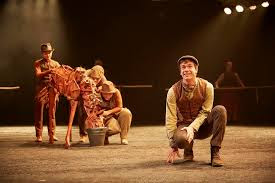The Private Sector
The Private Sector involves individual producers or a group of people that raise funding for theatrical productions. Some producers like to donate their own money as well to keep a production company going for years to come. Some production companies don't have access to local producers that are willing to donate money, so companies go to persuade private investors to fund their production. These local investors like to ask the production company if they can sponsor the production, so they are then mentioned in programmes (there is normally a full page description of the investor or the investor's company. In return, the investors seek out to promote the show to persuade audiences to go and watch their production. If the production company accepts the investors, as a generous gift, they may receive tickets for productions to give to their clients for their hard work. There are some individuals or organisations that sponsor performing arts theatre companies on a regular basis. This people are called Patrons. The amateur theatre company, The Mitre Players have always had patrons, and so they could always produce plays thanks to their funding. Here are some examples of private funded productions that have had funding by other companies or patrons:
The Public Sector
The Public Sector involves money that have been generated by the government or the National Lottery who have always funded the dramatic arts. The public money is given out to production companies at a national, regional and a local level. If the money was distributed at a local level and at a regional level, the money would have been generated by City or County Councils. These are known as Local Authorities. An example of a local city council is the London Borough of Croydon, who has been funding theatre arts as well as funding other non-dramatic activities for a number of years. If the money was distributed at a national level, the money would ben generated from The Department of National Heritage or The Arts Council of England, Wales, Scotland and Northern Ireland. The Department of National Heritage (now known as the Department for Culture, Media and Sport), was created in 1992 and has combined and funded relations to the dramatic arts, as well as broadcasting, film, sport, architecture and tourist sites. The Arts Council of England was formed in 1994 who invest money from the government and the National Lottery and generate it only to the arts and culture across England. This money is distributed regularly to production companies and theatres. During the years 2009/2010, the Arts Council of England generated a budget of £575 million pounds to support the arts. This money was given to amateur and professional production companies. The professional production companies include the Royal Shakespeare Company, the Royal National Theatre and the National Youth Music Theatre. The amateur production companies include The Barnstormers, who normally produce plays and theatre shows at the Barn Theatre, Oxted and The Minack Theatre, Porthcurno, Cornwall and The Tower Theatre Company, London.
School and College productions can either generate their money through the private and public sectors. Schools can have patrons who normally donate money to the school to make sure the production goes through. They can donate money to the show to help pay for lighting equipment, sound equipment, microphones and refreshments. The most used case for funding is school fairs. During school and college fairs, teachers might ask a couple of students, aged between Year 7 to Year 13, to perform an extract from a particular play. After the play has finished, adults might like to make generous donations if their performance was a success and they want to see typical performances like that again. Schools could also ask for funding by the government, in which they could request from the Arts Council of England to grant them money to pay for expensive lighting equipment, for example, colour washes and light spots which can move around the room to make the production more colourful, and sound equipment including microphones, sound effects etc. if a school needs it or if they need this type of money.









No comments:
Post a Comment